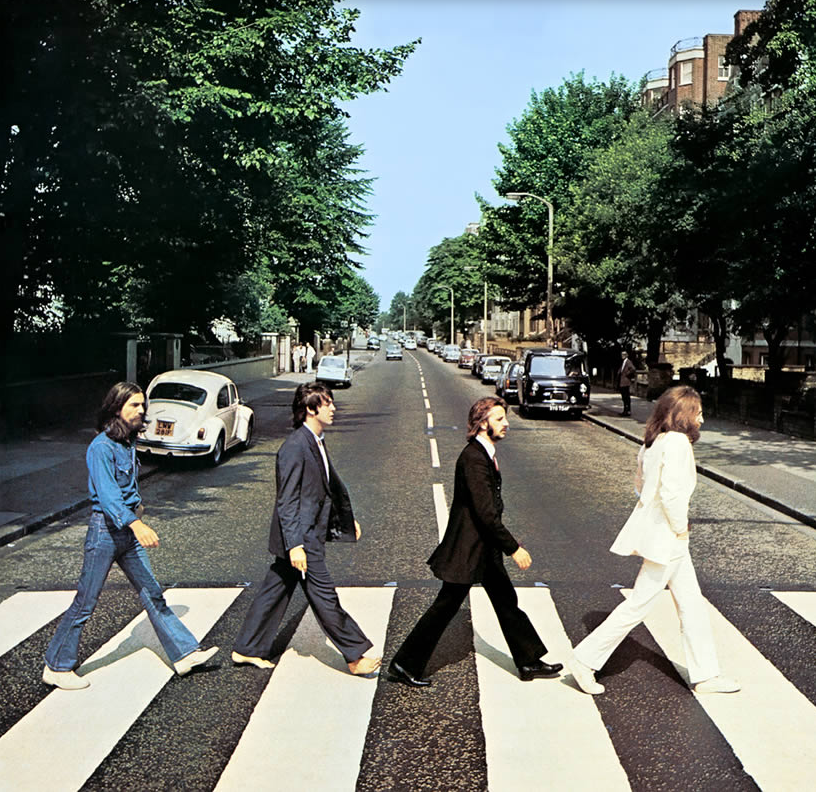Photo: The cover of the Beatles album “Abbey Road”
By Mary Lewis
On April 5, Belmont’s elementary school children will have the opportunity to attend school in-person and full-time for the first time since March 12, 2020. Middle and high school students will follow later this spring. On May 3, Belmont Center will resume the outdoor dining it first launched due to COVID last year. And on June 23, the pool will reopen – albeit with some limitations on numbers. These are opportunities for us to come together, hopefully mostly vaccinated, as a community. There’s a lot to look forward to after an excruciatingly difficult year. I can’t wait to reconnect with people I’ve barely seen for months.
Here is what I don’t want to overhear at an outdoor table in the center or poolside: arguments about what sports should be cut from the middle and high schools, whether theater is more important than music or vice versa, and which days the library should cut hours, or why there is trash overflowing at Joey’s, Pequosette, and Grove Street Parks on the weekends. If this happens, it will mean that the override has not passed, and while other towns are busy bouncing back from a horrible year, we will be compounding our public health crisis with a fiscal one that further divides our town.
It doesn’t have to be that way. If we acknowledge that acting now saves taxpayers money. Belmont’s multi-year structural deficit will not magically disappear if we ignore it. In fact, it will just get bigger. And, as welcome as the news is of federal aid for our small businesses, renters, and others facing difficulty meeting housing costs, we must face the fact that regarding the other aid promised to the town, only a very small percentage will be unrestricted or not allocated for COVID-related expenses.
If you put off painting your house because of sticker shock, you may have to replace rotting wood and paint your house – at much greater cost. We’re in the same situation with our town. Deferring maintenance and routine expenses makes things cost more, not less. Likewise, cutting first responders means paying overtime if those who are left are needed in an emergency. Failing to hire a procurement officer means we spend more, not less, on supplying our schools and town with the things they need to function, whether its road salt or school desks. Let’s not delude ourselves: as counterintuitive as it might seem, deferring a tax increase does not help our most vulnerable residents. It just makes our collective costs snowball, burdening us all more. Like a routine paint job before rot sets in, the override saves money in the long run.
This spring, let’s come together as a community again – finally – at school, in town center, at the pool, in our parks. And let’s come together as a community that assumes responsibility for maintaining and sustaining what we have before it falls apart.
Please join me in voting Yes on Question 1 on April 6.








Is it pretty clear what’s going on here? Maybe that’s the problem – what the town has been spending has not been clear. Perhaps the town budget has not been managed well for some time. Should some belt tightening have happened before now? To use another commentor’s analogy – if you live in a house that needs to be painted, why wait until it’s in desperate need to start thinking of the cost and how to pay for it?
Many thanks, Mary Lewis, for your excellent insights on the risks to our schools and community resources/services of not passing the override. Hoping everyone comes together and gets out and votes next Tuesday. There’s so much riding on this election…
Seriously? We need an override to have the DPW pick up trash from 3 playgrounds.
Yes, That’s what happens when you take a town budget to the bone, you can’t even afford weekend pay for the DPW.
Is the town administrators salary along with her bonuses and car allowance cutting a budget to the bone? How about the superintendent? He doesn’t even have a PhD and is being paid $250k plus per year. Governor Baker makes $180k. Why have we been paying full salaries for cafeteria workers and aides that haven’t done anything in a year?! Other towns laid off those workers to save money knowing what lies ahead. Did Belmont do that? No.
The town administrator makes less than the previous town administrator, David Kale, who also had a car allowance, would have made if he stayed and had merely received routine cost-of-living increases. He made $178,000 in 2016. https://govsalaries.com/kale-david-j-26984805
Garvin started at $168K
https://www.lowellsun.com/2017/12/15/town-administrator-garvin-leaves-for-belmont-at-start-of-2018/
She has brought in many grants that far exceed her salary. She more than earns her salary back in what she brings in to the town, and I can’t help but wonder if we’d even be talking about her salary if it were David Kale’s salary.
We have students in our schools eating eating school breakfasts and school lunches every day, and they have been all year. It’s not the case that our cafeteria workers “haven’t done anything in a year”.
Patrice Garvin manages a $70 million budget with hundreds of employees including public safety, public health, infrastructure. What do you think the proper salary for that role is? $90,000? As an example: the headmaster at Belmont Hill School, who manages a school with just 400 children gets a salary of $360,000 a year – far above Ms. Garvin with a fraction of the responsibility. Give me a break. Nobody complained about the salary and travel allowance for Ms. Garvin’s male predecessor. It’s pretty clear what’s going on here.